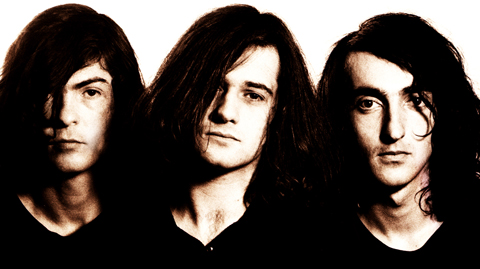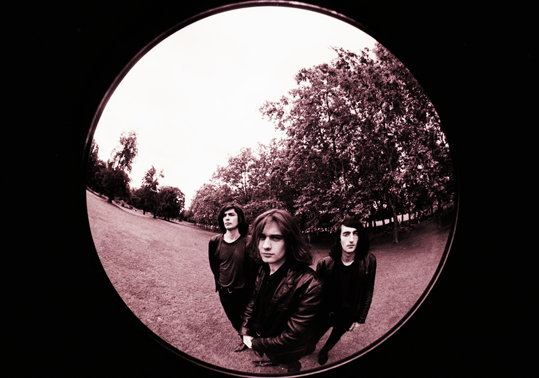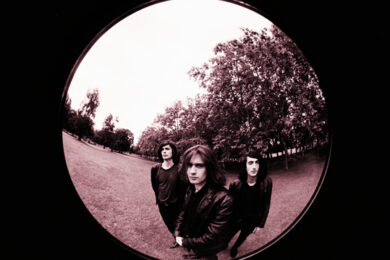"It was a very strange time and with hindsight – which is a beautiful thing – I didn’t like the way Loop ended so quickly and suddenly. It was like finding that your favourite uncle had terminal cancer and only had a week to live."
It is 20 years later but a sense of melancholy is still palpable in Robert Hampson’s voice down the phone line from his new Parisian base. The founder of shamanic drone-rockers Loop and the disintegrating ambience of Main is now newly signed to the Touch label, and releasing music under his own name. We’re speaking on the eve of the reissues of the first half of Loop’s back catalogue which is reviewed here on the Quietus.
"Predominantly the reason behind Loop musically speaking, well, it was pretty grim at the time in England with a lot of this jingly jangly C86 kind of stuff. I did like some of it but it was like punk hadn’t happened and I wanted something a little more aggressive. Even metal had lost its bite."
It was in the late 80’s that Hampson and Loop mainlined into the darker pools of Detroit and then dragged it into strange and monolithic new shapes.
"I’ve never worn my influences on my sleeve but never shied away from them either, a little bit of Stooges or MC5 and also Krautrock and so on – it was hopefully quite original. People always said it was quite psychedelic but it’s not in any West Coast way. It’s more about inner space than outer space – more inwardly looking, whereas much of 60s psychedelia was more outward looking."
This propulsive intensity lasted for several years as Loop submitted to a punishing schedule of endless touring and recording. The band then imploded brutally and quickly in 1990 after the release of their masterpiece A Gilded Eternity.
About the break-up: "There’s reasons I don’t want to go into it. It was very difficult to move into Hydra Calm [Main’s first release], and what became the Main stuff. That’s where I wanted Loop to go and I was finding it very hard to think about that in a rock band format. It’s very hard to tell a drummer who is a very very good drummer not to drum. I was going back to doing much more experimental music, the circle had turned and I wanted to return back to what I was doing before.
"One of the reasons I can explain was that we were very very tired and we were constantly touring, and if we weren’t touring we were always in the studio. We had a lot of demands from record companies and the American thing was really taking off – I think we could have easily broken America ‘cos when we went there it was just nuts. But it just got to us and with all relationships it affects the personal side of things. I mean, we weren’t arguing or had musical difficulties or any of that and when we finished we were still very friendly. If I’d gotten my shit together and said that I wanted four or five months off to just not think about Loop then we probably would have kept going. We were just mentally physically exhausted and there were other problems we were all having, and in the end I was the one that just turned round and said ‘I’ve had enough’. And also I was having all the worries about where we would go after A Gilded Eternity which I think it was probably our best work, although everybody seemed to not really like it at the time. But I think a lot of people have gone back to that record and found that it’s really stood the test of time even if I do say so myself."
On the one hand it’s tantalising to imagine a fifth album, but on the other, Loop’s demise is hardly surprising. Hampson has always restlessly moved on and it transpires that Loop was his only real foray into rock music having spent years either playing bass or experimenting with portastudios. Also, he is hardly what you would call a willing performer.
"I’d always wanted to hide. There were no sleeve notes and during gigs we would hide behind smoke – I’ve never been about personality-driven music. I’m getting on a bit now, I don’t really go to concerts anymore – I go to a lot more sit-down events these days [laughs] and people still find it unusual that I don’t want to play on stage. I’m really sick of all those bloody awful abstract videos and these days I just want to play in pitch black. And I’m really not that much of an interesting guy. I was thinking the other day that when I was playing in an auditorium… all I need to see is the faders on the mixing desk otherwise you can tell people are looking at you and, you know, don’t look."
Don’t look. Loop could never have broken America – Hampson is a soundhead, a sonic compulsive. There are many parallels with Kevin Shields’ recently reformed My Bloody Valentine, who were also alchemising rock at the same time – creating a removal of personality and an absolutely obsessive preoccupation with the microscopics of sound. I ask him how it felt to go back to those recordings.
"I have a very unusual relationship with Loop and it was a very big chain around my neck. I didn’t even want to speak about it for nearly 20 years, and I had also stopped using the guitar years ago. When I was doing the re-mastering I was like ‘Wow, this isn’t so bad’ as I really didn’t know what to expect. To put it in context, everybody still listened to vinyl and, not to besmirch anyone, probably their sound systems weren’t so great. Even though CDs were around at that point the sound quality was just fucking terrible, really thin. Nobody knew how to master through compact disc as it was such a new form and you could listen to these beautiful pieces of classical music or Roxy Music and just think that this isn’t the record that I owned and they sounded awful. Now that there are more competitively priced hi-fis and now that I’m happy with mastering and I think all the nuances are finally being heard. People have told me that there are some really unusual things going on that they had never heard before."

Main and Hampson’s eventual abandonment of the guitar can be seen as giving credence to the idea that the late 80s was rock’s final hurrah. From then on, an onslaught of new forms would sound the death knell for the relevance of the genre.
"[Rock] was far more eclectic then. Well you know what killed it. Basically it was acid house and Seattle. Nobody was interested in any bands unless they came out of Seattle, the grunge thing, and that got very boring very quickly. There were so many bad quality bands – I mean there were a couple that were good but the majority were fucking dreadful."
So, initially with Loop bandmate Scott Dawson, Hampson began Main, an extraordinary project that lasted 16 years and produced a swathe of music and sound that was startlingly original and idiosyncratic. It initially utilised the guitar only to literally deconstruct it.
"For the first few years that’s exactly what Main was, a process of the destruction of the guitar. It was trying to find ways of abstract the nature of such an iconic form. I mean it wasn’t exactly original as you had people like Keith Rowe [from AMM] but yeah, it was about trying to extract these nuances. Not even using it in a musical context and purely as a sound generator to try and remove the instrumental nature."
I offer that this is in many ways more loyal to the history of the guitar. Hampson is happy to agree, citing Hendrix’s use of feedback as a further example.
"I’m hardly claiming to be the first person to do this but hopefully I can pull it in to a contemporary context. I’ve never bothered about what date something was recorded, I mean I can still listen to Forever Changes and enjoy it as a contemporary record. The guitar finally went around Firmament IV when Scott Dawson left and I really couldn’t think of anything else to do with it. I just wasn’t interested anymore. The more concrete and electro acoustic and field recording material had become much more prominent – it was a natural progression for me as I had just done everything I could. Slightly later Fennesz came around and his take on the guitar was purely digital and I was like yeah that’s good, something’s new come along and it felt like the right time to walk away from it."
Main continued as a solo project for many years after that with Hampson finally winding it down a couple of years ago.
"Well, I’d been doing Main for 16 years and I didn’t think that the musical forms I was using (they were becoming much more compositional and direct) just didn’t suit it any more. When Main finished I was bored of trying to think of good names and everybody knew who I was at that point so it seemed less necessary to hide."
And then the move to Paris:
"Well, there are personal reasons and I’ve predominantly worked over there for the last four years. Because of the history there they’re a lot more open to [multi-speaker surround] sound systems. In England they look like you’ve just landed from somewhere if you ask for anything like that and they don’t want to spend the extra money either."
It makes huge sense for Hampson to be in France, a country that has tirelessly innovated in the realm of electronic, electro-acoustic and musique concrete for nearly 70 years now.
"I hate being pigeon-holed and I detest and refuse to be dragged in to being part of a scene – why can’t people just accept things for what they are? One of my biggest regrets is agreeing to do the isolationism thing [a compilation of experimental ambient music put together by Kevin ‘The Bug’ Martin a decade ago] cos I created a rod for my own back on that one. It’s no disrespect to Kevin or anything like that but again the minute that was coined and I was like ‘Oh God…’"
Europe, and especially France, seem to provide the perfect atmosphere for Hampson to work and play live in, one where his ideas, methodologies and sounds are perfectly suited and graciously accepted. His current label Touch is also home to artists like Chris Watson and Philip Jeck and couldn’t be more suited to his experiments.
"It’s been a long time but hopefully the Touch CD is coming out this year – two GRM [legendary experimental music institution] commissions and a planetarium with a 7.1 piece – these are all originally diffusion pieces but these are just the carte blanche stereo mixes."
With this new material and the wonderfully remastered back catalogue of Loop finally hitting the streets, it’s time for a major reassessment of one our great lost bands, and a tireless and humble musical innovator.



